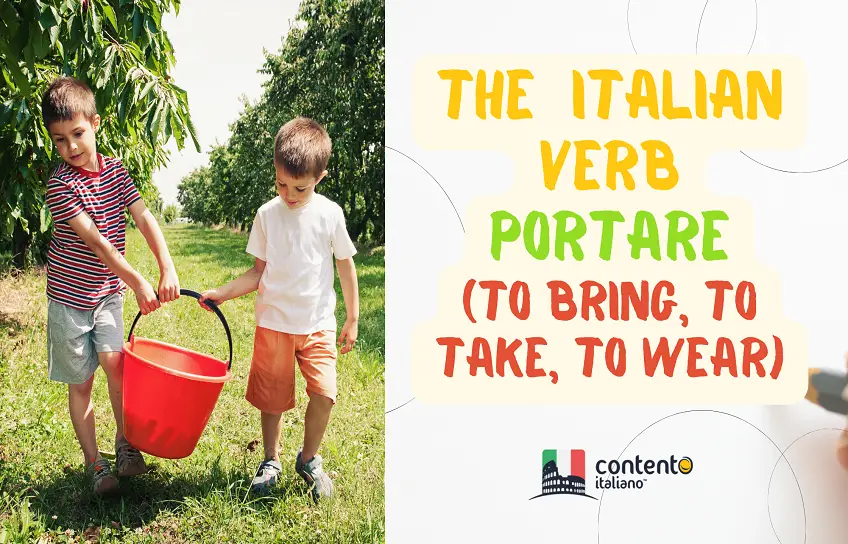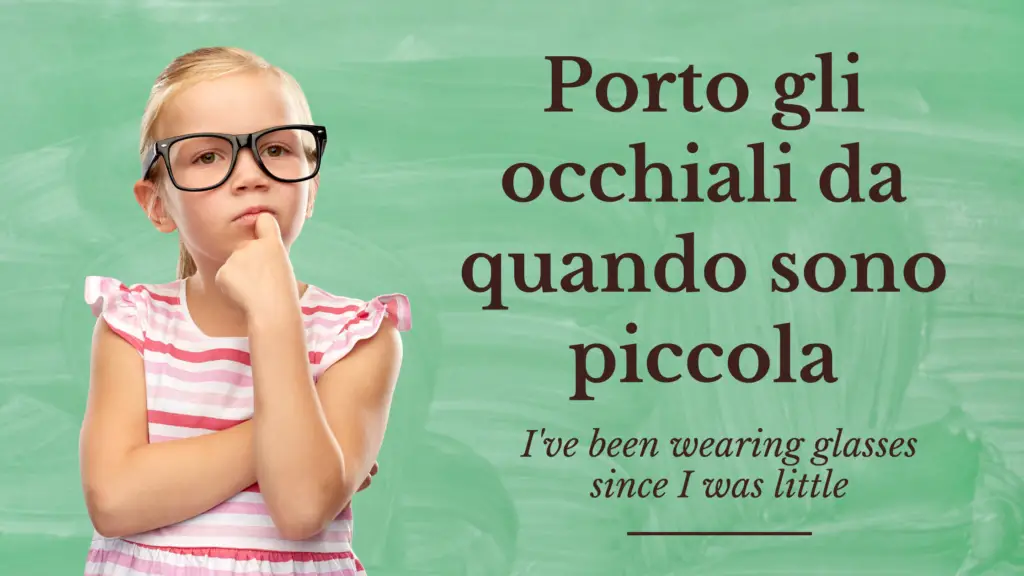
Written by Federica in Italian language
What is the meaning of portare?
The Italian verb portare means to bring, to take (something or someone somewhere), to wear and to carry.
For English speakers in particular, it’s important to avoid confusing portare (to take something or someone somewhere) with prendere (to get/ to collect). These are both translated as to take in English, which can give rise to confusion.
What conjugation does portare belong to?
Portare belongs to the first Italian conjugation. Its infinitive form ends in -are (portare), the past participle form is portato (regular) and the gerund ends in -ando (portando).
Is portare regular or irregular?
Portare is a regular verb, meaning that its verb endings follow a regular pattern throughout the conjugation. This regularity makes it easier to memorize it.
Does portare use an essere or avere auxiliary?
Italian compound tenses such as the present perfect (passato prossimo) require the main verb to be preceded by an auxiliary, essere or avere.
The verb portare takes the avere auxiliary in compound tenses when it is used in the active form (for example, porto gli occhiali – I wear glasses), but takes the essere auxiliary when used reflexively (for example, mi porto gli occhiali da sole – I’ll bring sunglasses with me).
Portare also takes the essere auxiliary when it is used in the passive form (for example, il formaggio è portato al mercato tutte le settimane – cheese is brought to the market every week).
How do Italians use portare?
Portare is a very useful verb to learn. Below are examples of the different ways in which it can be used. Note, in particular, how portare sometimes can be translated as to take:
- Portami lì – take me there (note, this uses the imperative mode, because it’s an order or invitation)
- Puoi portarmi un caffe per favore? – can you bring me a coffee please?
- Porto gli occhiali da quando sono piccola – I’ve been wearing glasses since I was little

- Di solito è la madre che li porta a scuola – usually, it’s the mother who takes them to school
- Lavora come guida turistica e durante l’ estate porta in giro i turisti per la città – he/she works as a tour guide and during the summer takes the tourists round the city
- Non hanno portato un ombrello – they haven’t brought an umbrella
- Hanno portato via tutto – they took everything away
- Per fortuna è riuscito a portare il cane in salvo – luckily he managed to bring the dog to safety
- Porto qualcosa? – shall I bring anything?
Portare used reflexively
When it means to bring something somewhere, portare is often used reflexively, meaning that the reflexive version of the verb is used instead of the non-reflexive version.
The reflexive pronoun means that you bring something for use by you. This doesn’t have an exact translation in English. The closest translation for it is “to bring something for me/ with me”.
Here are some of the same sentences as above, with portare used reflexively this time:
- Non si sono portati un ombrello – they haven’t brought an umbrella with them (implying “an umbrella for use by them”)

- Si sono portati via tutto – they took everything away (implying that they took it “with them”/ “for themselves”
- Mi porto qualcosa? – shall I bring anything with me/ for myself? (the question means “is there anything I should bring that could be useful for me?”
Italian set phrases with portare
Here are some useful set phrases which use the verb portare:
- Portare avanti – to take forward / to progress something
Stanno portando avanti un progetto molto complicato
They are progressing a very difficult project
- Portarsi avanti – to make progress (note: this is reflexive because it is applied to yourself “to move yourself forward”)
Vedo che ti sei portata avanti
I see you made progress
- Portare in giro – to take (someone) for a ride (note, the same set phrase can be made with prendere. In fact, prendere is a more common verb for this set phrase).
Mi porti in giro?
Are you taking me for a ride?
- Portare pazienza – to have patience (note, an alternative option for this is simply avere pazienza)
Bisogna portare pazienza
You need to be patient
Synonyms of portare
Synonyms of portare vary depending on how this verb is used and what it means in context.
Below is a table showing possible synonims of portare. Note that some of these are not an exact match of portare, but we’ve tried to go with the closest possible match.
| English phrase | Italian phrase using portare | Italian phrase using a synonym of portare |
|---|---|---|
| To take someone somewhere | La madre porta i figli a scuola | La madre accompagna i figli a scuola |
| To bring someone something | Ti porto un cappuccino | Ti faccio un cappuccino (note this uses fare– to make, so it’s a far from exact match) |
| To make progress | Mi sono portata avanti | Ho fatto progresso |
| To wear | Porto gli occhiali | Indosso gli occhiali |
Nouns related to portare
One interesting noun related to the verb portare is portata, meaning dish, course.
Un pasto completo ha cinque portate
A full meal has five courses
It’s interesting to note that the word porta (door), related to portare from Latin because it is to do with structural support, is identical to the imperative form of portare (you bring) and also the third person indicative present tense (lui/ lei porta – he/ she brings).
Look to the context of the sentence to discern whether the speaker is using the verb to bring, or talking about a door.
The complete conjugation of portare
In the table below you can see the complete conjugation of portare in all tenses and moods.
| Verb Tense | IO | TU | LUI/ LEI | NOI | VOI | LORO |
|---|---|---|---|---|---|---|
| Present indicative | porto | porti | porta | portiamo | portate | portano |
| Present perfect indicative | ho portato | hai portato | ha portato | abbiamo portato | avete portato | hanno portato |
| Imperfect indicative | portavo | portavi | portava | portavamo | portavate | portavano |
| Past perfect indicative | avevo portato | avevi portato | aveva portato | avevamo portato | avevate portato | avevano portato |
| Remote past indicative | portai | portasti | portò | portammo | portaste | portarono |
| Preterite perfect indicative | ebbi portato | avesti portato | ebbe portato | avemmo portato | aveste portato | ebbero portato |
| Simple future indicative | porterò | porterai | porterà | porteremo | porterete | porteranno |
| Future perfect indicative | avrò portato | avrai portato | avrà portato | avremo portato | avrete portato | avranno portato |
| Present conditional | porterei | porteresti | porterebbe | porteremmo | portereste | porterebbero |
| Past perfect conditional | avrei portato | avresti portato | avrebbe portato | avremmo portato | avreste portato | avrebbero portato |
| Imperative | porta | portiamo | portate | |||
| Present gerund | portando | portando | portando | portando | portando | portando |
| Past gerund | avendo portato | avendo portato | avendo portato | avendo portato | avendo portato | avendo portato |
| Present subjunctive | porti | porti | porti | portiamo | portiate | portino |
| Present perfect subjunctive | abbia portato | abbia portato | abbia portato | abbiamo portato | abbiate portato | abbiano portato |
| Imperfect subjunctive | portassi | portassi | portasse | portassimo | portaste | portassero |
| Past perfect subjunctive | avessi portato | avessi portato | avesse portato | avessimo portato | aveste portato | avessero portato |







